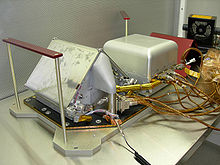Thermal and Evolved Gas Analyzer

The Thermal and Evolved Gas Analyzer (TEGA) is a scientific instrument aboard the Phoenix spacecraft, a Mars lander which landed and operated on the planet Mars in 2008. TEGA's design is based on experience gained from the failed Mars Polar Lander. Soil samples taken from the Martian surface by the robot arm are eventually delivered to the TEGA, where they are heated in an oven to about 1,000 °C. This heat causes the volatile compounds to be given off as gases which are sent to a mass spectrometer for analysis. This spectrometer is adjusted to measure particularly the isotope ratios for oxygen, carbon, nitrogen, and heavier gases. Detection values are as low as 10 parts per billion. The Phoenix TEGA has 8 ovens, which are enough for 8 samples.
Major components:[1]
- Differential Scanning Calorimeter
- Mass Spectrometer
The soil was delivered to TEGA by a robotic arm with a scoop.[2]

See also
[edit]- CheMin
- Mars Scout Program
- Sample Analysis at Mars
- Urey instrument
- Viking lander biological experiments (Viking program)
References
[edit]- ^ "TEGA - Phoenix 2007 Mars Scout Lander". planetary.chem.tufts.edu. Archived from the original on 2004-07-08. Retrieved 2018-02-04.
- ^ Hoffman, J; Chaney, R; Hammack, H (2008-10-01). "Phoenix Mars Mission—The Thermal Evolved Gas Analyzer". Journal of the American Society for Mass Spectrometry. 19 (10): 1377–1383. Bibcode:2008JASMS..19.1377H. doi:10.1016/j.jasms.2008.07.015. ISSN 1044-0305. PMID 18715800.
External links
[edit]- Phoenix site description of TEGA Archived 2017-11-11 at the Wayback Machine
- TEGA archives software Archived 2010-07-04 at the Wayback Machine
- NASA TEGA



